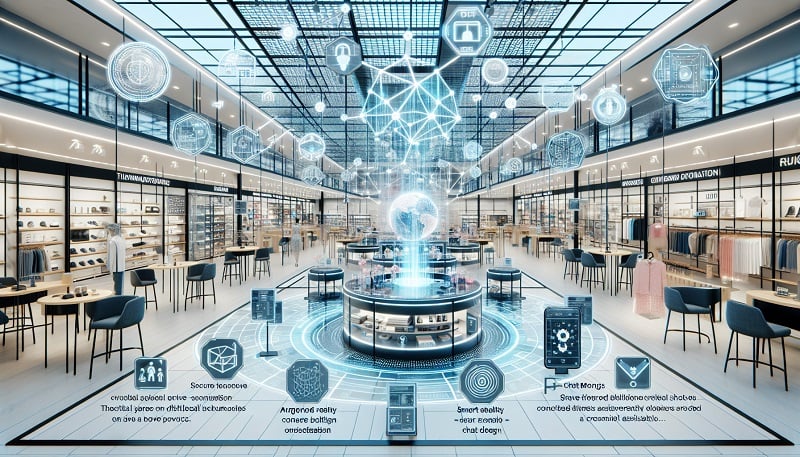Retail Tech Trends: How emerging technologies shape the future of retail, from Augmented Reality to AI
The retail industry is undergoing a rapid digital transformation, with emerging technologies playing a crucial role in shaping the future of shopping experiences. As consumers increasingly embrace digital channels and demand more personalized, convenient and engaging interactions with brands, retailers must stay ahead of the curve by adopting innovative solutions.
From augmented reality to artificial intelligence, let’s explore how these cutting-edge technologies are revolutionizing the retail landscape and driving growth for businesses that embrace them.
Augmented Reality Enhances Shopping Experiences
Augmented reality (AR) is transforming the way consumers interact with products and make purchasing decisions. By overlaying digital information onto the real world, AR enables shoppers to virtually try on clothing, accessories and even makeup, providing a more immersive and personalized experience. For example, Sephora’s Virtual Artist app allows customers to experiment with different makeup looks using their smartphone camera, while IKEA’s Place app lets users visualize furniture in their own homes before making a purchase. These engaging experiences not only boost customer confidence but also reduce the likelihood of returns, as shoppers can make more informed decisions. Another industry that AR has taken by storm, is online gaming and betting. As AR technology continues to advance, retailers who invest in these solutions will be well-positioned to capture the attention and loyalty of tech-savvy consumers.
Artificial Intelligence Revolutionizes Customer Service
Artificial intelligence (AI) is another game-changer in the retail industry, particularly in the realm of customer service. AI-powered chatbots and virtual assistants are becoming increasingly sophisticated, enabling retailers to provide 24/7 support and personalized recommendations to customers. By leveraging natural language processing and machine learning, these intelligent agents can understand and respond to customer queries, resolve issues and even anticipate needs based on previous interactions. Additionally, AI can analyze vast amounts of customer data to generate insights into consumer behavior, preferences and sentiment, allowing retailers to optimize their marketing strategies and improve overall customer satisfaction. AI is also present in many other sectors, for example betting and wagering, where it gives people insights for top slots in the UK. As AI continues to evolve, we can expect to see even more innovative applications in the retail sector, from dynamic pricing to predictive inventory management.
Blockchain Technology Transforms Supply Chain Management
Blockchain technology, best known as the foundation of cryptocurrencies like Bitcoin, is also making waves in the retail industry. By providing a secure, transparent and decentralized ledger system, blockchain enables retailers to streamline their supply chain operations and enhance traceability. With blockchain, every step of a product’s journey—from manufacturer to store shelf—can be recorded and verified, reducing the risk of counterfeit goods and improving overall supply chain efficiency. Moreover, blockchain-based smart contracts can automate various processes, such as payments and inventory management, further reducing costs and increasing speed. As consumers are placing more and more value on the origin and sustainability of the products they buy, blockchain technology offers a powerful tool for retailers to build trust and transparency in their supply chains.
Internet of Things Creates Smart Retail Environments
The Internet of Things (IoT) is transforming retail spaces into intelligent, connected environments that can adapt to customer needs in real-time. By leveraging a network of sensors, cameras and other devices, retailers can collect valuable data on customer behavior, preferences and movements within the store. This information can be used to optimize store layouts, personalize marketing messages and even automate certain tasks, such as restocking shelves or adjusting lighting and temperature based on customer feedback. Additionally, IoT-enabled smart shelves can track inventory levels and alert staff when items are running low, while smart mirrors can provide personalized product recommendations and enable virtual try-ons. As the cost of IoT devices continues to decrease and the technology becomes more accessible, we can expect to see more retailers embracing these solutions to create immersive, data-driven shopping experiences.
Embracing Change
The future of retail is undeniably digital, and emerging technologies like augmented reality, artificial intelligence, blockchain and the Internet of Things are leading the way. As these innovations continue to evolve and mature, retailers who embrace them will be better equipped to meet the changing needs and expectations of modern consumers. By investing in these technologies, businesses can unlock new opportunities for growth, differentiation and customer engagement, ultimately driving success in an increasingly competitive and fast-paced industry. As the retail landscape continues to transform, those who adapt and innovate will be the ones who thrive in the years to come.














